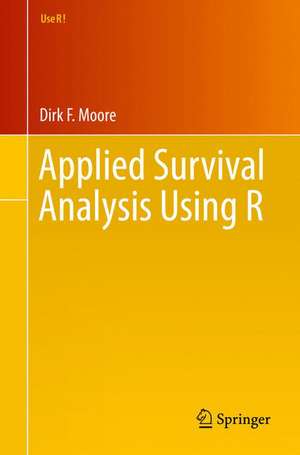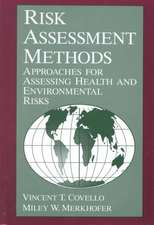Applied Survival Analysis Using R: Use R!
Autor Dirk F. Mooreen Limba Engleză Paperback – 20 mai 2016
Applied Survival Analysis Using R covers the main principles of survival analysis, gives examples of how it is applied, and teaches how to put those principles to use to analyze data using R as a vehicle. Survival data, where the primary outcome is time to a specific event, arise in many areas of biomedical research, including clinical trials, epidemiological studies, and studies of animals. Many survival methods are extensions of techniques used in linear regression and categorical data, while other aspects of this field are unique to survival data. This text employs numerous actual examples to illustrate survival curve estimation, comparison of survivals of different groups, proper accounting for censoring and truncation, model variable selection, and residual analysis.
Because explaining survival analysis requires more advanced mathematics than many other statistical topics, this book is organized with basic concepts and most frequently used procedures covered in earlier chapters, with more advanced topics near the end and in the appendices. A background in basic linear regression and categorical data analysis, as well as a basic knowledge of calculus and the R system, will help the reader to fully appreciate the information presented. Examples are simple and straightforward while still illustrating key points, shedding light on the application of survival analysis in a way that is useful for graduate students, researchers, and practitioners in biostatistics.
Din seria Use R!
- 15%
 Preț: 676.86 lei
Preț: 676.86 lei - 17%
 Preț: 362.74 lei
Preț: 362.74 lei - 15%
 Preț: 591.79 lei
Preț: 591.79 lei - 17%
 Preț: 362.15 lei
Preț: 362.15 lei - 17%
 Preț: 461.36 lei
Preț: 461.36 lei -
 Preț: 226.73 lei
Preț: 226.73 lei - 17%
 Preț: 395.94 lei
Preț: 395.94 lei -
 Preț: 374.86 lei
Preț: 374.86 lei - 20%
 Preț: 500.66 lei
Preț: 500.66 lei - 17%
 Preț: 396.92 lei
Preț: 396.92 lei - 15%
 Preț: 360.58 lei
Preț: 360.58 lei - 17%
 Preț: 430.21 lei
Preț: 430.21 lei -
 Preț: 276.09 lei
Preț: 276.09 lei - 15%
 Preț: 497.12 lei
Preț: 497.12 lei - 15%
 Preț: 471.53 lei
Preț: 471.53 lei - 15%
 Preț: 525.35 lei
Preț: 525.35 lei -
 Preț: 489.30 lei
Preț: 489.30 lei - 15%
 Preț: 523.07 lei
Preț: 523.07 lei -
 Preț: 455.89 lei
Preț: 455.89 lei - 15%
 Preț: 518.73 lei
Preț: 518.73 lei - 18%
 Preț: 835.24 lei
Preț: 835.24 lei - 15%
 Preț: 498.94 lei
Preț: 498.94 lei - 18%
 Preț: 783.35 lei
Preț: 783.35 lei - 18%
 Preț: 783.20 lei
Preț: 783.20 lei - 15%
 Preț: 523.91 lei
Preț: 523.91 lei -
 Preț: 484.47 lei
Preț: 484.47 lei -
 Preț: 420.40 lei
Preț: 420.40 lei - 15%
 Preț: 523.07 lei
Preț: 523.07 lei - 15%
 Preț: 695.70 lei
Preț: 695.70 lei - 15%
 Preț: 499.12 lei
Preț: 499.12 lei - 15%
 Preț: 493.89 lei
Preț: 493.89 lei - 15%
 Preț: 584.10 lei
Preț: 584.10 lei - 15%
 Preț: 591.47 lei
Preț: 591.47 lei - 15%
 Preț: 497.31 lei
Preț: 497.31 lei - 15%
 Preț: 696.02 lei
Preț: 696.02 lei -
 Preț: 420.02 lei
Preț: 420.02 lei -
 Preț: 489.87 lei
Preț: 489.87 lei - 15%
 Preț: 579.66 lei
Preț: 579.66 lei -
 Preț: 486.42 lei
Preț: 486.42 lei - 15%
 Preț: 507.95 lei
Preț: 507.95 lei -
 Preț: 388.34 lei
Preț: 388.34 lei - 15%
 Preț: 496.67 lei
Preț: 496.67 lei -
 Preț: 423.47 lei
Preț: 423.47 lei - 15%
 Preț: 520.61 lei
Preț: 520.61 lei - 15%
 Preț: 531.26 lei
Preț: 531.26 lei - 15%
 Preț: 576.52 lei
Preț: 576.52 lei -
 Preț: 454.16 lei
Preț: 454.16 lei
Preț: 419.06 lei
Nou
Puncte Express: 629
Preț estimativ în valută:
80.18€ • 83.95$ • 66.35£
80.18€ • 83.95$ • 66.35£
Carte tipărită la comandă
Livrare economică 05-19 aprilie
Preluare comenzi: 021 569.72.76
Specificații
ISBN-13: 9783319312439
ISBN-10: 331931243X
Pagini: 12
Ilustrații: XIV, 226 p. 66 illus., 26 illus. in color.
Dimensiuni: 155 x 235 x 18 mm
Greutate: 0.36 kg
Ediția:1st ed. 2016
Editura: Springer International Publishing
Colecția Springer
Seria Use R!
Locul publicării:Cham, Switzerland
ISBN-10: 331931243X
Pagini: 12
Ilustrații: XIV, 226 p. 66 illus., 26 illus. in color.
Dimensiuni: 155 x 235 x 18 mm
Greutate: 0.36 kg
Ediția:1st ed. 2016
Editura: Springer International Publishing
Colecția Springer
Seria Use R!
Locul publicării:Cham, Switzerland
Cuprins
Introduction.- Basic Principles of Survival Analysis.- Nonparametric Survival Curve Estimation.- Nonparametric Comparison of Survival Distributions.- Regression Analysis Using the Proportional Hazards Model.- Model Selection and Interpretation.- Model Diagnostics.- Time Dependent Covariates.- Multiple Survival Outcomes and Competing Risks.- Parametric Models.- Sample Size Determination for Survival Studies.- Additional Topics.- References.- Appendix A.- Index.- R Package Index.
Recenzii
“This book describes the principles of survival analysis, gives examples of how it is applied, and teaches how to put those principles to use to analyze data using R. … The intended audience includes students taking a master's level course in statistical theory and analysts who need to work with survival time data. … This is an excellent overview of the main principles of survival analysis and its applications with examples using R for the intended audience.” (Hemang B. Panchal, Doody’s Book Reviews, August, 2016)
Notă biografică
Dirk F. Moore is Associate Professor of Biostatistics at the Rutgers School of Public Health and the Rutgers Cancer Institute of New Jersey. He received a Ph.D. in biostatistics from the University of Washington in Seattle and, prior to joining Rutgers, was a faculty member in the Statistics Department at Temple University. He has published numerous papers on the theory and application of survival analysis and other biostatistics methods to clinical trials and epidemiology studies.
Textul de pe ultima copertă
Applied Survival Analysis Using R covers the main principles of survival analysis, gives examples of how it is applied, and teaches how to put those principles to use to analyze data using R as a vehicle. Survival data, where the primary outcome is time to a specific event, arise in many areas of biomedical research, including clinical trials, epidemiological studies, and studies of animals. Many survival methods are extensions of techniques used in linear regression and categorical data, while other aspects of this field are unique to survival data. This text employs numerous actual examples to illustrate survival curve estimation, comparison of survivals of different groups, proper accounting for censoring and truncation, model variable selection, and residual analysis.
Because explaining survival analysis requires more advanced mathematics than many other statistical topics, this book is organized with basic concepts and most frequently used procedures covered in earlier chapters, with more advanced topics near the end and in the appendices. A background in basic linear regression and categorical data analysis, as well as a basic knowledge of calculus and the R system, will help the reader to fully appreciate the information presented. Examples are simple and straightforward while still illustrating key points, shedding light on the application of survival analysis in a way that is useful for graduate students, researchers, and practitioners in biostatistics.
Because explaining survival analysis requires more advanced mathematics than many other statistical topics, this book is organized with basic concepts and most frequently used procedures covered in earlier chapters, with more advanced topics near the end and in the appendices. A background in basic linear regression and categorical data analysis, as well as a basic knowledge of calculus and the R system, will help the reader to fully appreciate the information presented. Examples are simple and straightforward while still illustrating key points, shedding light on the application of survival analysis in a way that is useful for graduate students, researchers, and practitioners in biostatistics.
- Clearly illustrates concepts of survival analysis principles and analyzes actual survival data using R, in addition to including an appendix with a basic introduction to R
- Organized via basic concepts and most frequently used procedures, with advanced topics toward the end of the book and in appendices
- Includes multiple original data sets that have not appeared in other textbooks
Caracteristici
Clearly illustrates concepts of survival analysis principles and analyzes actual survival data using R, in addition to including an appendix with a basic introduction to R Organized via basic concepts and most frequently used procedures, with advanced topics toward the end of the book and in appendices Includes multiple original data sets that have not appeared in other textbooks Includes supplementary material: sn.pub/extras












